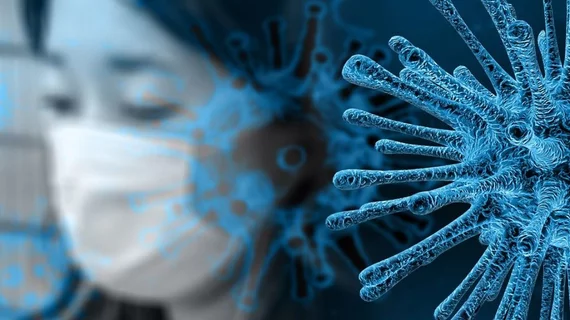Just days before the American College of Cardiology canceled its annual scientific sessions for the first time in the meeting’s 69-year history, it released a set of guidelines for cardiology care teams dealing with the COVID-19 outbreak.
It’s hard to get away from COVID-19, the coronavirus that spread from its epicenter in Wuhan, China, to hundreds of global communities in a matter of months. Major medical societies have canceled or postponed conferences that were in the works for years, local governments are limiting or banning international travel and major sporting events, including the NBA’s 2019-2020 season, have been suspended. The overall case fatality rate (CFR) of COVID-19 hovers around 2.3%, according to the ACC’s March 6 document—reported CFRs have ranged from 2.7% in Iran to 0.5% in South Korea—but healthcare workers remain at a significant risk.
“To best serve your patients, protect yourself first,” the College wrote. “This is especially true for cardiovascular care team professionals that will be on the front line of the COVID-19 response.”
The ACC recommends that such team members wash their hands often; use masks, gloves and other personal protective equipment; and regularly decontaminate surfaces including stethoscopes, cellphones, computer peripherals and other medical devices.
It was found early on in the outbreak that underlying CVD was a risk factor for COVID-19 mortality; depending on the report, physicians estimate between 25% and 50% of COVID-19 patients present with underlying conditions. CFRs have been 6% higher in patients with hypertension, 7.3% higher in patients with diabetes and 10.5% higher in those with established CVD.
The ACC said cardiac complications of COVID-19 seem to be commensurate with those of past coronaviruses, including SARS and MERS, and influenza analogs. One recent case report on 138 hospitalized COVID-19 patients found that 16.7% of patients developed an arrhythmia and 7.2% experienced acute cardiac injury.
“Published and anecdotal reports indicate cases of acute onset heart failure, myocardial infarction, myocarditis and cardiac arrest,” the ACC wrote. “As with any acute illness, higher cardiometabolic demand can precipitate cardiac complications.”
To keep cardiovascular patients who contract COVID-19 safe, the College recommends quickly identifying and isolating those patients—even in ambulatory settings—and making sure that patients are up to date on their flu and pneumococcal vaccines. In areas with active coronavirus outbreaks, the ACC said, physicians may consider using telehealth to treat.
The ACC cautioned that COVID-19 might “overshadow” the classic signs and symptoms of acute MI, so, to avoid underdiagnosis, cardiologists should keep an eye out for more run-of-the-mill cardiac cases, too. The College said specific protocols should be developed to manage AMI in the context of a COVID-19 outbreak, with specific emphasis on acute PCI and CABG and keeping lab personnel to a minimum.
“The routine transmission of COVID-19 to healthcare workers suggests that everyday infectious disease mitigation precautions are insufficient and healthcare workers in outbreak geographies must be prepared to adopt personal protection measures,” the document reads. “Protocols for the diagnosis, triage, isolation and management of COVID-19 patients with cardiovascular complications and/or cardiovascular patients with COVID-19 should be developed in detail and rehearsed; CV-specific plans should be developed in collaboration with hospital-wide infectious disease response plans and in close collaboration with other medical specialities.”
Related COVID-19 Content:
Myocarditis, arrhythmias and more: An ACC update on what cardiologists know about long COVID-19
Athletes with COVID-19 may require heart MRI screening for myocarditis, new data suggest
4 cardiac arrhythmias associated with COVID-19
What we know about COVID-19 and cardiogenic shock
Mild COVID-19 infections not associated with long-term risk of heart damage
The pandemic’s toll: 55 long-term side effects of COVID-19
4 key takeaways from an updated look at vaccine-related myocarditis in the U.S.
Most young people with vaccine-related myocarditis recover quickly
Intrathoracic complications in COVID patients: Incidence, associations and outcomes
Congenital heart disease increases risk of poor COVID-19 outcomes, including death
MRI scans show COVID's 'significant' impact on the brain
Heart complication seen for the first time in a young patient after COVID-19 vaccination
American Heart Association investing $10 million to study the long-term consequences of COVID-19
Cardiologist discusses COVID-19, myocarditis among professional athletes and more
Not so fast: Specialists warn against cardiac imaging for asymptomatic COVID-19 patients
Study shows COVID-19 can infect heart cells—and do serious damage in the process

